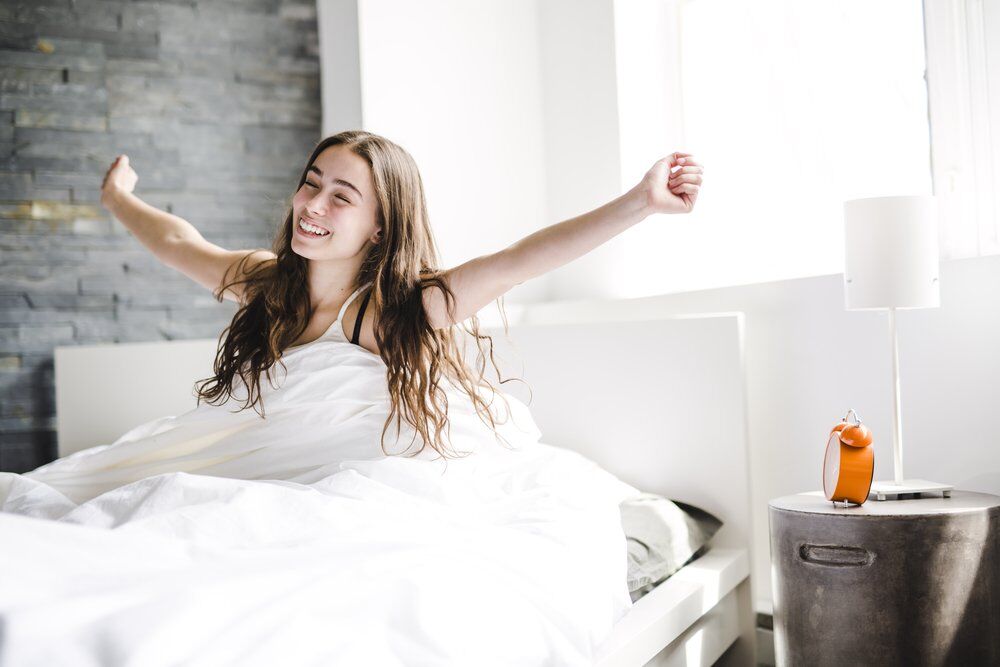
5 Tips To Ensure A Better Night’s Sleep
In today’s hustle and grind culture, evident in the 45.3 million Instagram hashtags they share, it’s often deemed heroic of a person to pull 18 hour work days and only sleep 4-5 hours a night. With this approach often being a trademark sign of dedication and success, it’s clear to see why sleep is often the most neglected aspect of achieving a healthy body, mind and lifestyle.
Yet, sleep is such an important facet of our lives, so much in fact, that its equates to one-third of our life (when we get enough of it, that is).
When we look at the importance of sleep, we have to take into account both the quantity (hours) and quality that we’re getting. Even if you do manage to get in 7-9 hours of sleep each night, it won’t have much benefit if the quality of those hours is poor.
Getting poor quality sleep is like sitting on a stationary bike. Your feet may be pedalling, but there’s no forward momentum or progress.
With that in mind, here’s our 5 tips on how to ensure you get a better night of sleep.
Limit your exposure to light
Ensuring you get a good night’s sleep starts long before you get into bed.
In the hours leading up to your usual bedtime you want to start creating an environment that tells your brain that it’s time to slow down and relax.
We can do this by limiting or removing ourselves from blue light – the wavelengths that are immitted from the screens of our TV’s, laptops and phones. Blue light has been shown to suppress the Melatonin in our system – a hormone that plays a crucial role in helping us sleep. (1)
Alongside this, switch off lights around the house or dim lights down throughout the evening and then go to bed in a completely blacked out room (2) – no phones allowed!.
Get the right nutrients
Ensuring you have a varied and nutritious diet can go a long way in ensuring a goods night sleep, with vitamins and minerals D, E, B’s, Calcium and Iron all having shown benefits to a restful nights kip.
Magnesium is another key mineral that has been associated with better sleep and even combating insomnia. (3) Taking a Magnesium supplement can help with lower levels of cortisol (4), whilst raising melatonin within the body, allowing your CNS (Central Nervous System) to relax.
Lead an active lifestyle
Leading an active lifestyle, whether its getting in your 10,000 steps a day or hitting numerous heavy weights session a week is not only good for your body but it will also aid in achieving a good nights sleep and leave you feeling less drowsy throughout the day.
What’s even better is that it works both ways. Not only does exercise help you sleep, but getting quality sleep will also improve your physical performance, as sleep is directly correlated with maximal strength output and metabolic health . (5)
Keep your bedroom cool
In order to initiate sleep your body and brain need to drop in temperature, which is why it’s easier to fall asleep in a room that’s too cold, rather than too hot.
We can help this process along by enjoying a hot bath or shower before bed, which despite seeming counter intuitive, can help us fall into a deeper and more relaxed sleep. This works through a process called Vasodilation. (6)
When you bath or shower, the heat from the water makes your blood vessels widen, allowing heat to be expelled from the body. What proceeds to occur is a massive dump of heat and your core body temperature plummets, allowing you to fall into a deeper and better quality sleep.
Have a bedtime Journal
Falling asleep can be tricky when you’ve got 101 different scenarios rushing through your head.
Journaling can be a great way to get those thoughts out of your mind and in doing so, lower levels of stress before our head hits the pillow.
Coincidently, when we sleep our brain starts to processes and figures out information, often leading us to be able to make better decisions and think through problems more clearly the next day. It’s why, when faced with an issue, you are always told to “sleep on it” and never to “stay awake on it”.
References
- Holzman DC. What’s in a color? The unique human health effect of blue light. Environ Health Perspect. 2010;118(1)
- Gooley JJ, Chamberlain K, Smith KA, et al. Exposure to room light before bedtime suppresses melatonin onset and shortens melatonin duration in humans. J Clin Endocrinol Metab. 2011;96(3)
- Boomsma D. The magic of magnesium. International journal of pharmaceutical compounding. 2008;12(4)
- Golf SW, Happel O, Graef V, Seim KE. Plasma aldosterone, cortisol and electrolyte concentrations in physical exercise after magnesium supplementation. Journal of clinical chemistry and clinical bioichemistry. 1984;22(11)
- Knowles OE1, Drinkwater EJ2, Urwin CS2, Lamon S1, Aisbett B3. Inadequate sleep and muscle strength: Implications for resistance training. Journal of science and medicine in sport. 2018;21(9)
- Charkoudian N. Mechanisms and modifiers of reflex induced cutaneous vasodilation and vasoconstriction in humans. J Appl Physiol (1985). 2010;109(4)


No Comments yet!